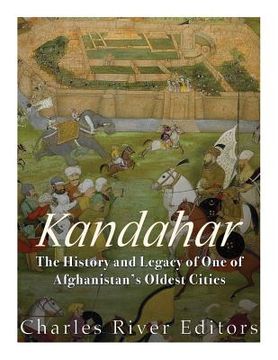Kandahar: The History and Legacy of One of Afghanistan's Oldest Cities (en Inglés)
Reseña del libro "Kandahar: The History and Legacy of One of Afghanistan's Oldest Cities (en Inglés)"
*Includes pictures *Includes accounts of the city *Includes online resources and a bibliography for further reading The city of Kandahar dates back to the middle of the first millennium BCE, originally as a Persian town on the edge of the great Registan Desert in southeastern Afghanistan that was reestablished and repopulated by Alexander the Great in the 4th century BCE. The ancient site of Kandahar developed on a rocky ridge some 3 kilometers to the west of the present-day city of the same name, which was founded in the 18th century. Kandahar was strategically located on the trade routes connecting India and the Middle East, and for this reason it was the target of many conquerors throughout the ages. The city has been in the hands of Persians, Greeks, Arabs (from the 7th century), Turks (10th century), Mongols (12th century) and Indians (16th century). Later it was conquered by the Safavid-Persians and the Ghilji, a tribe instrumental in the emergence of the modern state of Afghanistan. Nonetheless, as one writer put it, "The Arab Muslim armies that arrived in the 7th century were following the routes used previously by Persian and Greek invaders, but none of these empires, or the nearly 20 empires and dynasties that came late, found Afghanistan easy to conquer and control. The Afghan peoples, though internally divided, tend to unite in fierce opposition to outsiders." The old city of Kandahar was abandoned following its near-total destruction in 1738, but a few years later a new city was founded a few kilometers to the east, at the location of present-day Kandahar. Between 1748 and 1773 this was the capital of the new kingdom of Afghanistan. Subsequently, the city was temporarily conquered by British troops during the Anglo-Afghan wars, and has been the site of considerable fighting and destruction during the ongoing conflicts in the region. Almost half of Kandahar's history is interlinked with the rise and dominance of Islam in southeastern Afghanistan. Indeed, there is a bias towards the Islamic period in the city's narrative, because of two factors: the near-total destruction of the city's pre-Islamic archaeological remains in 1738, and the lack of excavation (and interpretation of excavated materials) in the modern period, due in part to the ongoing conflicts that the country faces. However, on a broader scale, the story of Kandahar is one of great cultural, political, and religious fusion. Throughout antiquity and the modern period, this region has been closely linked to the processes of cultural and mercantile exchanges between the neighboring regions of the east, north and west. Kandahar encountered diverse collection of religions because of its position on the frontiers between India, the Middle East, and the Silk Road. One of the earliest religious systems of the region was Zoroastrianism and the worship of Ahura Mazda, which continued to persist in the region up to the 10th and 11th centuries CE. With the conquests of Alexander the Great the region encountered the Greek pantheon of deities. Around the time of the Mauryan dynasty, Buddhism extended from India into Afghanistan. Islam arrived to the region in the 7th century CE, and for a period of time Gautama and Muhammad were venerated equally by the population of Kandahar. Kandahar: The History and Legacy of One of Afghanistan's Oldest Cities looks at the remarkable city and its impact on the region. Along with pictures depicting important people, places, and events, you will learn about Kandahar like never before.

